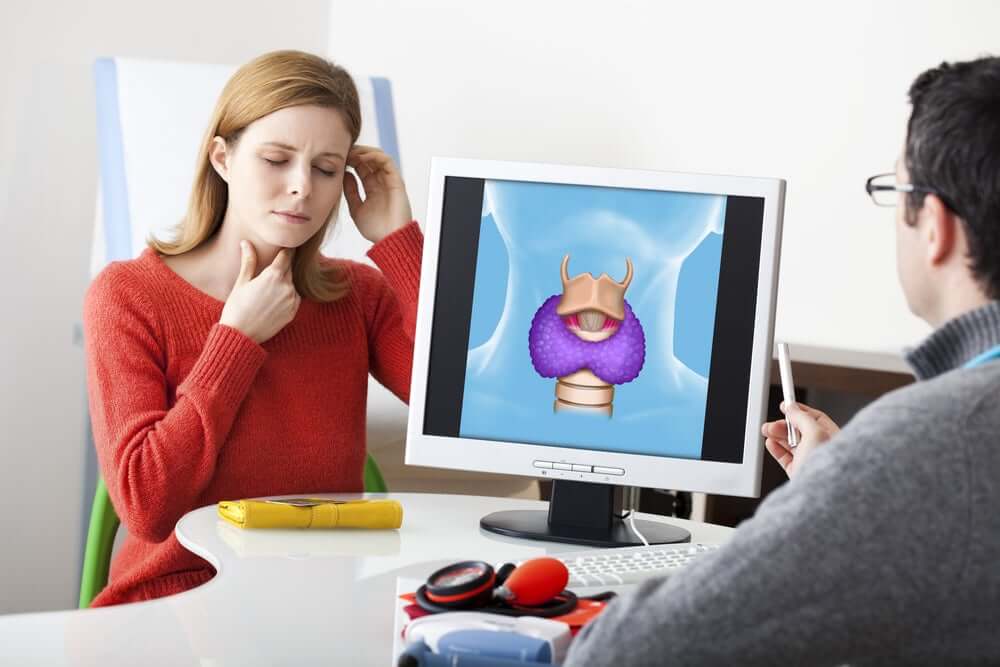Types of Hormones: Which Are the Most Important?

There are several types of hormones in the human body, but all of them fulfill the task of helping to specify the biological and chemical processes in the body. In reality, they’re very powerful, as just a small amount of them can cause huge changes in the cells and even the whole body.
All kinds of hormones are sophisticated chemical messengers that travel throughout the bloodstream. They travel to the tissues and organs where they complete their task, which they generally do slowly, but they’re essential to life.
The endocrine glands mainly have the task of producing different types of hormones. Among these glands, the pituitary gland, penal gland, thymus, thyroid, suprarenal gland, and pancreas all stand out. The testicles in males and the ovaries in females are also added to this list.
Hormones
Hormones are chemical substances that some specialized cells in the body secrete. Almost all organs in the body produce hormones but the most critical are those that the endocrine glands secrete.
The brain has the task of directing the symphony of hormones that course through our bodies. When the nervous system receives a stimulus, like cold for example, it sends a signal to the brain. The brain then interprets this, and later sends a new signal to the corresponding gland or organ so that it can release the hormones and deal with the situation.
Among the most relevant functions that our hormones complete, we find the following:
- Growth and development of the body
- Use and saving of energy
- Regulation of the level of liquid in the blood
- Regulation of salt and sugar in the body
- Sexual characteristics
- Reproduction

Keep reading: Thyroid Problems During Pregnancy: What’s the Big Deal?
Types of hormones
We can classify the different types of hormones in different ways. According to their point of origin, they’re either natural or synthetic. Natural hormones are those that the body produces naturally, and synthetic hormones are those we get from a laboratory, generally to compensate for some kind of pathological deficit.
Similarly, the different types of hormones can be classified according to their area of action. So, we have the following:
- Autocrine hormones: these act only on the area of the cell that synthesizes them.
- Pancrine hormones: these act on the neighboring cells of the cell that synthesizes them,
From nature’s point of view, they’re in the following groups:
- Steroid hormones: these come from cholesterol like androgens, testosterone, progesterone, and estrogen.
- Protein hormones: this type forms from a chain of amino acids and peptides, like insulin and glucagon.
According to their chemical classification, we can classify them as:
- Peptide hormones: these form from chains of amino acid, polypeptides, and oligopeptides, like vasopressin, insulin, and the growth hormone.
- Lipid hormones: hormones that are lipophilic in nature, like testosterone and cortisol.
- Derived from amino acids: these come from tryptophan or tyrosine, like adrenaline.
Finally, according to their solubility, they can be classed as:
- Hydrophilic: they dissolve in water.
- Lipophilic: they don’t dissolve in water, but they do dissolve in lipids.

Discover more: The Release of Adrenaline: the Activation, Stress, and Headache Hormone
The most important hormones
It’s not easy to make a list of the most important hormones, since all of them fulfill relevant functions in a large or small way. However, if we had to choose which hormones have more importance in the human being, we could say the following:
- Somatropin: more commonly known as “the growth hormone”, its basic function is to stimulate the growth process, cellular reproduction, and tissue regeneration. Our height and organ development depend on this hormone, among other things.
- Thyroxine: this hormone participates in the metabolism to convert calories into energy.
- Adrenaline or epinephrine: this is both a hormone and a neurotransmitter. It activates us and puts us on high alert, allowing for an adequate fight or flight reaction.
- Glucagon and insulin: both of these regulate the levels of sugar in the blood; insulin reduces them and glucagon raises them.
- Estrogens: this group of hormones make the cells of the uterus and ovaries multiply; they influence the metabolism of fats and avoid the bones becoming decalcified.
- Progesterone: this hormone supports pregnancy and gestation, in addition to regulating the menstrual cycle.
- Testosterone: this hormone plays a role in the development of the testicles, prostate, and secondary sexual characteristics for males; it’s also involved in physical performance and organ size. High levels of testosterone are related to aggression.
All our hormones are important
In conclusion, as we’ve explained, all of our hormones are important. They fulfill essential functions for our existence, and, quite simply, we couldn’t live without them.
An endocrinologist is a doctor who specializes in hormone disorders, and you can consult them if you have any concerns. Many anomalies can be solved by a small dosage of artificial hormone.
All cited sources were thoroughly reviewed by our team to ensure their quality, reliability, currency, and validity. The bibliography of this article was considered reliable and of academic or scientific accuracy.
- Salinas, C. A. A., & Trujillo, J. A. E. (2019). Alexánderson: Fisiología de los sistemas endocrino y digestivo. Manual Moderno.
- Brandan, Nora, et al. “Hormonas tiroideas.” Actualización. Argentina: Universidad Nacional del Nordeste (2007): 1-7.
- Gardner, David G., and FRANCIS S. GREENSPAN. Basic & clinical endocrinology. Lange Medical Books:, 2003.
This text is provided for informational purposes only and does not replace consultation with a professional. If in doubt, consult your specialist.








